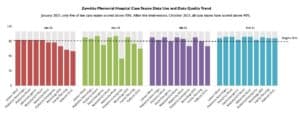Non-monetary Incentives Cultivate Data Use Culture in Ethiopia’s Zewditu Memorial Hospital
August 12th, 2022 | story
In 2019, the Ethiopian Ministry of Health (MOH) and Addis Ababa City Administration Health Bureau selected the nearly100-year-old Zewditu Memorial Hospital as a learning site for the implementation of the Information Revolution (IR), a national health information systems (HIS) initiative aimed at transforming data collection, sharing, and use to ensure effective service delivery. To realize this objective, the Ethiopia Data Use Partnership (DUP), a joint initiative of JSI Research & Training Institute, Inc. and the MOH, offered interventions that included HIS trainings; regular mentorship with IR assessments, and disseminating progress among the hospital teams.
Prior to DUP’s intervention in October 2020, Zewditu Memorial Hospital scored 82 percent in the baseline IR status assessment, meaning it had an adequate monitoring and evaluation (M&E) and information-sharing infrastructure in place, but with unsatisfactory functionality. With DUP’s intensive support, the hospital established a functioning M&E tool and health information exchange system, and began conducting monthly departmental performance monitoring team (PMT) meetings. A year later, the hospital was able to share information across the health structures in Addis Ababa and scored 95 percent in the status assessment, which upgraded it to the IR model status. Following this success, Addis Ababa Health Bureau declared Zewditu one of the best hospitals in the capital.
Upon closer look, however, the hospital’s much-applauded data quality practices were restricted to the top of the organizational structure, and were not fully replicated at the lower tiers, including the case-team level at which services are provided and health data generated. The hospital decided to prioritize data quality checks at the point of collection with the case teams. PMT meetings, a major internal checkpoint, enable teams to identify performance gaps, analyze root causes, resolve challenges, and ultimately improve services by interpreting data. Although PMTs were established at the case-team level, the lack of regular review meetings and follow up to resolve identified gaps obstructed improvement.
In response, DUP designed a non-monetary incentive mechanism to institutionalize data quality checks during PMT meetings. In December 2020, the team introduced the scheme to hospital management, which, having witnessed the importance of PMTs in boosting performance at the department level, agreed to pilot it with 10 of 25 case teams. Case teams were chosen based on generating large amounts of data and advanced HIS performance. To ensure common understanding of quality data collection and use, DUP conducted a baseline assessment to identify skills gaps among the 47 case team staff members, and provided on-the-job training in DHIS2, data quality, and information use accordingly. The team emphasized ensuring data quality and use by applying standards and tools, such as PMT and review performance.
Case team staff were also oriented to the incentive methods. Health workers were familiarized with the IR assessment guide and checklist, and a list of criteria for self-assessment and evaluation. If a team scored more than 90 percent, it would be recognized and awarded as a best performer. To ensure a fair and accurate rating, staff were informed that their IR self-assessment reports would be verified every two months by the internal health management information system (HMIS) unit, and every quarter by external evaluators from the health bureau and DUP. These assessments rate the functionality of PMTs as well as data quality and use practices. Staff agreed that the incentive would be written and verbal recognition of the best performer. To increase visibility and esteem, the management team recognize the best performing case teams during quarterly high-level hospital meetings. The winners’ information and performance are displayed on the hospital’s smart screen TV for the public and posted on the hospital’s Telegram group.
The HMIS unit and hospital management were deeply involved in the initiation’s implementation, which increased staff awareness on the importance of good-quality data. Case teams began conducting monthly IR self-assessments and PMT meetings, and as a result, began submitting higher quality service data to their respective departments, which aggregated and presented them at the monthly hospital department meeting. Since the launch of the effort, DUP and the Addis Ababa Health Bureau have conducted three consecutive external verification assessments of the pilot case teams. Findings showed a steady rise of the IR score in almost all, which implies that the data quality and use activities are improving. At initiative baseline in January 2021, only five case teams scored more than 90 percent, and the lowest score was 70 percent. In October 2021, the last external verification, showed that all case teams scored more than 90 percent. Overall, the average IR assessment score of the case teams improved from 86 to 96 percent (see figure below).

Frehiwot Admasu, a health worker from the pediatric ward case team, said, “The incentive mechanism enabled our team to thoroughly investigate the different performances on infant morbidity and mortality. One of the successes achieved was that we were able to reduce infant mortality from 5 percent to 2 percent in our ward by doubling daily patience rounds.” Eden Alemayehu, the hospital medical director, observed “a positive competitive spirit among teams,” and said that the process encouraged staff to perform better by increasing their accountability.
The non-monetary incentive mechanism contributed to the Zewditu’s overall IR score not just by flowing the culture of PMT from the department to case team level, but also by enabling the upward flow of higher quality and more reliable data from point of service to the departments. Harnessing staff motivation has proven to be cost effective, increase ownership and accountability, and foster positive competition among departments. Moreover, the mechanism can easily be adopted by other health facilities to reinforce a positive and lasting data use culture.
Written by Debritu Kebede and Solomon Mezigebu
We strive to build lasting relationships to produce better health outcomes for all.